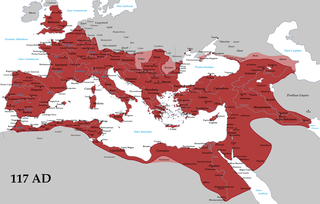According to Roman mythology, Amata was the wife of Latinus, king of the Latins, and the mother of their only child, Lavinia. In the Aeneid of Virgil, she commits suicide during the conflict between Aeneas and Turnus over which of them would marry Lavinia.
In Greek mythology, Linus may refer to the following personages:
Bas was the first independent ruler of Bithynia. He ruled for fifty years, from 376 to 326 BC, and died at the age of 71.

The Dictionary of Greek and Roman Geography, first published in 1854, was the last of a series of classical dictionaries edited by the English scholar William Smith (1813–1893), which included as sister works A Dictionary of Greek and Roman Antiquities and the Dictionary of Greek and Roman Biography and Mythology. As declared by Smith in the Preface: "The Dictionary of Geography ... is designed mainly to illustrate the Greek and Roman writers, and to enable a diligent student to read them in the most profitable manner". The book stays up to the description: in two massive volumes the dictionary provides detailed coverage of all the important countries, regions, towns, cities, geographical features that occur in Greek and Roman literature, without forgetting those mentioned solely in the Bible. The work was last reissued in 2005.
Philip was satrap of Sogdiana. He was first appointed to this position by Alexander the Great in 327 BC. He retained his post, as did most of the satraps of the more remote provinces, in the arrangements which followed the death of the king in 323 BC; but in the subsequent partition at Triparadisus in 321 BC, he was assigned the government of Parthia instead. Here he remained until 318 BC, when Peithon, who was then seeking to establish his power over all the provinces of the East, made himself master of Parthia, and put Philip to death.
For other persons with the same name, see Tlepolemus (disambiguation)
Acanthus the Lacedaemonian, was the victor in two footrace events, the diaulos (δίαυλος) and dolichos (δόλιχος), in the Olympic Games of 720 BC. He was also, according to some accounts, the first who ran naked in these games. Other accounts ascribe this to Orsippus the Megarian. Thucydides says that the Lacedaemonians were the first who contended naked in gymnastic games, although he does not mention Acanthus by name.
Adusius was, according to the account of Xenophon in his Cyropaedeia, sent by Cyrus the Great with an army into Caria, to put an end to the feuds which existed in the country. He afterwards assisted Hystaspes in subduing Phrygia, and was made satrap of Caria, as the inhabitants had requested.
The gens Aebutia was a Roman family that was prominent during the early Republic. The gens was originally patrician, but also had plebeian branches. The first member to obtain the consulship was Titus Aebutius Elva, consul in 499 BC.
Aetna was in Greek and Roman mythology a Sicilian nymph and, according to Alcimus, a daughter of Uranus and Gaia, or of Briareus. Stephanus of Byzantium says that according to one account Aetna was a daughter of Oceanus. Simonides said that she had acted as arbitrator between Hephaestus and Demeter respecting the possession of Sicily. By Zeus or Hephaestus she became the mother of the Palici. Mount Aetna in Sicily was believed to have derived its name from her, and under it Zeus buried Typhon, Enceladus, or Briareus. The mountain itself was believed to be the place in which Hephaestus and the Cyclops made the thunderbolts for Zeus.
Bion of Abdera was a Greek mathematician of Abdera, Thrace, and a pupil of Democritus. He wrote both in the Ionic and Attic dialects, and was the first who said that there were some parts of the earth in which it was night for six months, while the remaining six months were one uninterrupted day.
Timasitheus was an athlete of Delphi, who was victorious several times in the pankration at the Olympic and Pythian Games, and was also distinguished as a brave soldier.
Aleuas or Alevas can refer to more than one person from ancient Greek myth and history:
Almo was in ancient Roman religion the eponymous god of the small river Almo in the vicinity of Rome. Like Tiberinus and others, he was prayed to by the augurs of Rome. In the water of Almo the aniconic stone embodying the mother of the gods, Cybele, used to be washed. He had a naiad daughter named Larunda.
The gens Aliena or Alliena was a plebeian family of the Roman Republic. The first member of the gens to achieve prominence was Lucius Alienus, plebeian aedile in 454 BC. However, the family then slipped into obscurity for several centuries, emerging once more in the first century BC.
The gens Apustia was a plebeian family at Rome during the period of the Republic. The first member of this gens who obtained the consulship was Lucius Apustius Fullo, in 226 BC.
The gens Arellia was a plebeian family at Rome. The gens does not appear to have been particularly large or important, and is known primarily from three individuals.
Boteiras was a local prince of the region of Bithynia, and the father of Bas of Bithynia, first independent ruler of Bithynia, who governed fifty years, from 376 to 326 BCE.





